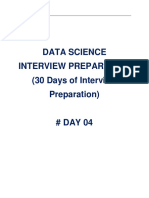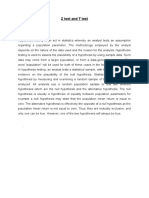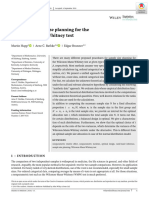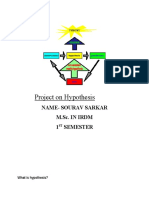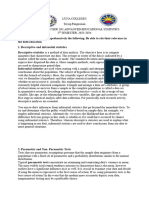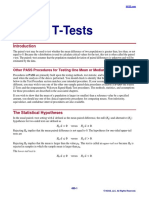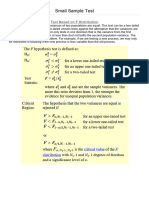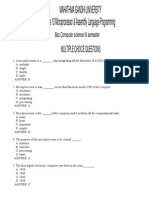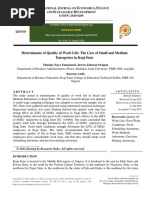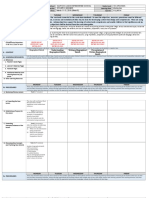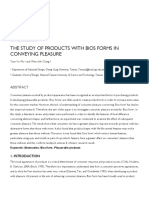Neyman Pearson Lemma
Neyman Pearson Lemma
Uploaded by
amiba45Copyright:
Available Formats
Neyman Pearson Lemma
Neyman Pearson Lemma
Uploaded by
amiba45Copyright
Available Formats
Share this document
Did you find this document useful?
Is this content inappropriate?
Copyright:
Available Formats
Neyman Pearson Lemma
Neyman Pearson Lemma
Uploaded by
amiba45Copyright:
Available Formats
NeymanPearson lemma
From Wikipedia, the free encyclopedia
In statistics, the NeymanPearson lemma, named after Jerzy Neyman and Egon Pearson, states that when performing a hypothesis test between two point hypotheses H0: = 0 and H1: = 1, then the likelihood-ratio test which rejects H0 in favour of H1 when
where
is the most powerful test of size for a threshold . If the test is most powerful for all (UMP) for alternatives in the set .
, it is said to be uniformly most powerful
In practice, the likelihood ratio is often used directly to construct tests see Likelihood-ratio test. However it can also be used to suggest particular test-statistics that might be of interest or to suggest simplified tests for this one considers algebraic manipulation of the ratio to see if there are key statistics in it related to the size of the ratio (i.e. whether a large statistic corresponds to a small ratio or to a large one).
Contents
1 Proof 2 Example 3 See also 4 References 5 External links
Proof
Define the rejection region of the null hypothesis for the NP test as
Any other test will have a different rejection region that we define as given parameter as
. Furthermore, define the probability of the data falling in region R,
For both tests to have size , it must be true that
It will be useful to break these down into integrals over distinct regions:
and
Setting
and equating the above two expression yields that
Comparing the powers of the two tests,
and
, one can see that
Now by the definition of
Hence the inequality holds.
Example
Let be a random sample from the distribution where the mean is known, and suppose that we wish to test for against . The likelihood for this set of normally distributed data is
We can compute the likelihood ratio to find the key statistic in this test and its effect on the test's outcome:
This ratio only depends on the data through hypothesis for this data will depend only on . So we should reject if
. Therefore, by the NeymanPearson lemma, the most powerful test of this type of . Also, by inspection, we can see that if , then is a decreasing function of
is sufficiently large. The rejection threshold depends on the size of the test. In this
example, the test statistic can be shown to be a scaled Chi-square distributed random variable and an exact critical value can be obtained.
See also
Statistical power
References
Neyman, J.; Pearson, E. S. (1933). "On the Problem of the Most Efficient Tests of Statistical Hypotheses". Philosophical Transactions of the Royal Society A: Mathematical, Physical and Engineering Sciences 231 (694706): 289. doi:10.1098/rsta.1933.0009 (http:// dx.doi.org/10.1098%2Frsta.1933.0009) . cnx.org: NeymanPearson criterion (http://cnx.org/content/m11548/latest/)
External links
Cosma Shalizi, a professor of statistics at Carnegie Mellon University, gives an intuitive derivation of the NeymanPearson Lemma using ideas from economics (http://cscs.umich.edu/~crshalizi/weblog/630.html) Retrieved from "http://en.wikipedia.org/w/index.php?title=NeymanPearson_lemma&oldid=546859364" Categories: Statistical theorems Statistical tests This page was last modified on 25 March 2013 at 05:13. Text is available under the Creative Commons Attribution-ShareAlike License; additional terms may apply. See Terms of Use for details. Wikipedia is a registered trademark of the Wikimedia Foundation, Inc., a non-profit organization.
You might also like
- Parametric Test RDocument47 pagesParametric Test RRuju VyasNo ratings yet
- Likelihood-Ratio TestDocument5 pagesLikelihood-Ratio Testdev414No ratings yet
- Likelihood Ratio TestDocument6 pagesLikelihood Ratio TestBernard OkpeNo ratings yet
- I Would Like To Present A Simple Example To Illustrate Statistical Hypothesis Testing. 1Document8 pagesI Would Like To Present A Simple Example To Illustrate Statistical Hypothesis Testing. 1forwardhoNo ratings yet
- Chi Square TestDocument49 pagesChi Square TestDr.B.THAYUMANAVARNo ratings yet
- Engineering Data Analysis Probability: Probability Is A Measure Quantifying The Likelihood That Events Will OccurDocument8 pagesEngineering Data Analysis Probability: Probability Is A Measure Quantifying The Likelihood That Events Will OccurCharlotte FerriolNo ratings yet
- Non Parametric TestsDocument12 pagesNon Parametric TestsHoney Elizabeth JoseNo ratings yet
- Chi - Square HistoryDocument10 pagesChi - Square HistoryGena ClarishNo ratings yet
- ST 511 Self NotesDocument6 pagesST 511 Self NotesvikasptkNo ratings yet
- 2statistics Prac NewDocument13 pages2statistics Prac NewAnshpreet KaurNo ratings yet
- Data Science Interview Preparation (30 Days of Interview Preparation)Document27 pagesData Science Interview Preparation (30 Days of Interview Preparation)Satyavaraprasad BallaNo ratings yet
- Student's T TestDocument56 pagesStudent's T TestmelprvnNo ratings yet
- Common Statistical TestsDocument12 pagesCommon Statistical TestsshanumanuranuNo ratings yet
- Z Test and T TestDocument7 pagesZ Test and T TestTharhanee MuniandyNo ratings yet
- Parametric Vs Non Paramteric TestsDocument5 pagesParametric Vs Non Paramteric TestsmerinNo ratings yet
- Tests of HypothesisDocument16 pagesTests of HypothesisDilip YadavNo ratings yet
- Fisher's Exact TestDocument9 pagesFisher's Exact TestShahzad Asghar ArainNo ratings yet
- BST413 12jan Page1to11Document11 pagesBST413 12jan Page1to117wgbjkmg94No ratings yet
- Null Hypothesis TestingDocument5 pagesNull Hypothesis Testingmkdswzgig100% (2)
- Statistics and ProbabilityDocument6 pagesStatistics and ProbabilityRonaldNo ratings yet
- Chi Square NotesDocument12 pagesChi Square NotesMia ChristieNo ratings yet
- Introduction: Hypothesis Testing Is A Formal Procedure For Investigating Our IdeasDocument7 pagesIntroduction: Hypothesis Testing Is A Formal Procedure For Investigating Our IdeasRaven SlanderNo ratings yet
- 19 Statistical Testing 1-1Document41 pages19 Statistical Testing 1-1Muhammad JazibNo ratings yet
- Entropy: Statistical Information: A Bayesian PerspectiveDocument11 pagesEntropy: Statistical Information: A Bayesian PerspectiveMiguel Angel HrndzNo ratings yet
- Happ 2018Document13 pagesHapp 2018Mochamad YoviNo ratings yet
- Fisher On DesignDocument15 pagesFisher On DesignkhurshidNo ratings yet
- Statistics For A2 BiologyDocument9 pagesStatistics For A2 BiologyFaridOraha100% (1)
- Chapter No. 08 Fundamental Sampling Distributions and Data Descriptions - 02 (Presentation)Document91 pagesChapter No. 08 Fundamental Sampling Distributions and Data Descriptions - 02 (Presentation)Sahib Ullah MukhlisNo ratings yet
- Hypothesis Testing: Definition: The Hypothesis Testing Refers To The Predefined Formal Procedures That Are Used byDocument4 pagesHypothesis Testing: Definition: The Hypothesis Testing Refers To The Predefined Formal Procedures That Are Used byAbrar AhmadNo ratings yet
- Is Important Because:: The Normal DistributionDocument19 pagesIs Important Because:: The Normal DistributionRohanPuthalathNo ratings yet
- 2.6 RM Module 3 z-test-1.pptxDocument33 pages2.6 RM Module 3 z-test-1.pptxRoopsha ShaikhNo ratings yet
- Teste Statistice ExplicatiiDocument53 pagesTeste Statistice ExplicatiigeorgianapetrescuNo ratings yet
- Testul Chi PatratDocument9 pagesTestul Chi PatratgeorgianapetrescuNo ratings yet
- Statistical TestsDocument9 pagesStatistical Testsalbao.elaine21No ratings yet
- Biostatistics Notes: Descriptive StatisticsDocument16 pagesBiostatistics Notes: Descriptive StatisticsRuvimbo T ShumbaNo ratings yet
- Biostatistics NotesDocument8 pagesBiostatistics NotesTubocurareNo ratings yet
- Sas ProcsDocument8 pagesSas ProcsPrasad TvsnvNo ratings yet
- Project On Hypothesis: Name-Sourav Sarkar M.Sc. in Irdm 1 SemesterDocument6 pagesProject On Hypothesis: Name-Sourav Sarkar M.Sc. in Irdm 1 SemesterSourav SarkarNo ratings yet
- P Values Are Random VariablesDocument5 pagesP Values Are Random Variablesaskazy007No ratings yet
- Biostatistics NotesDocument10 pagesBiostatistics NotesYusuf NyonyntonoNo ratings yet
- Statistical TestsDocument11 pagesStatistical Testsluzviminda.dulayNo ratings yet
- Joe MainDocument30 pagesJoe MainpengdingpkuNo ratings yet
- Final ExamDocument5 pagesFinal ExamLosarim MalingNo ratings yet
- Paired T-Tests: Other PASS Procedures For Testing One Mean or Median From Paired DataDocument13 pagesPaired T-Tests: Other PASS Procedures For Testing One Mean or Median From Paired Datajay SinghNo ratings yet
- Physics 509: Intro To Hypothesis Testing: Scott Oser Lecture #13 October 23, 2008Document29 pagesPhysics 509: Intro To Hypothesis Testing: Scott Oser Lecture #13 October 23, 2008OmegaUserNo ratings yet
- What Is Hypothesis TestingDocument32 pagesWhat Is Hypothesis TestingNasir Mehmood Aryani100% (1)
- BOT 614 Test of Significance - 095338Document3 pagesBOT 614 Test of Significance - 095338PeaceNo ratings yet
- Chapter 12Document26 pagesChapter 12maroof_mirNo ratings yet
- New Microsoft Word DocumentDocument7 pagesNew Microsoft Word DocumentJ TNo ratings yet
- Bayes Good ApplicationDocument7 pagesBayes Good Applicationemil_248No ratings yet
- CH 11 - Small Sample TestDocument8 pagesCH 11 - Small Sample TesthehehaswalNo ratings yet
- Sample SizeDocument13 pagesSample SizeMuhammad RiyadhNo ratings yet
- Lab 4 InstructionsDocument11 pagesLab 4 Instructionsapi-405320544No ratings yet
- Differences and Similarities Between ParDocument6 pagesDifferences and Similarities Between ParPranay Pandey100% (1)
- function of non parametric testsDocument3 pagesfunction of non parametric testsps7250012No ratings yet
- (Sici) 1097 0258 (19980715) 17 13 1495 Aid Sim863 3.0Document13 pages(Sici) 1097 0258 (19980715) 17 13 1495 Aid Sim863 3.0A BNo ratings yet
- TtestDocument8 pagesTtestMarvel EHIOSUNNo ratings yet
- Statistics Tutorial: Hypothesis Tests: Null Hypothesis. The Null Hypothesis, Denoted by HDocument66 pagesStatistics Tutorial: Hypothesis Tests: Null Hypothesis. The Null Hypothesis, Denoted by Htafi66No ratings yet
- Schaum's Easy Outline of Probability and Statistics, Revised EditionFrom EverandSchaum's Easy Outline of Probability and Statistics, Revised EditionNo ratings yet
- Data Mining KDD ProcessDocument22 pagesData Mining KDD Processamiba45No ratings yet
- Data Mining KDD ProcessDocument22 pagesData Mining KDD Processamiba45No ratings yet
- Linear Discriminant Analysis SummaryDocument12 pagesLinear Discriminant Analysis Summaryamiba45No ratings yet
- WP34s Calculator ManualDocument211 pagesWP34s Calculator ManualSteve MynottNo ratings yet
- Analytic Continuation WikiDocument3 pagesAnalytic Continuation Wikiamiba45No ratings yet
- Standard ScoreDocument2 pagesStandard Scoreamiba45No ratings yet
- Privacy and SurveillanceDocument46 pagesPrivacy and SurveillanceAnnabel IzlanaNo ratings yet
- Microprocessor and Assembly Language Programming 402 PDFDocument38 pagesMicroprocessor and Assembly Language Programming 402 PDFGurram Sunitha83% (6)
- Written Analysis & Communication: Case Analysis Ramesh Patel at Aragon Entertainment LimitedDocument6 pagesWritten Analysis & Communication: Case Analysis Ramesh Patel at Aragon Entertainment LimitedAmandeep DahiyaNo ratings yet
- BSR 255 I DiscussDocument32 pagesBSR 255 I DiscussNURUL IZZAH MOHD RIZDZUANNo ratings yet
- Interview Question: "What Is Your Greatest Weakness?": Topic 4 Personal WeaknessesDocument6 pagesInterview Question: "What Is Your Greatest Weakness?": Topic 4 Personal WeaknessesDisti AgesNo ratings yet
- Angel Youngs - Google SearchDocument1 pageAngel Youngs - Google SearchJessica VeronicaNo ratings yet
- README GCC TDMDocument6 pagesREADME GCC TDMRehanNo ratings yet
- DS-80 & SAL R1a BrochuresDocument4 pagesDS-80 & SAL R1a BrochuresMurdionoNo ratings yet
- Chapter 1 - Globalization TheoriesDocument2 pagesChapter 1 - Globalization TheoriesJohnRexNo ratings yet
- Module - 3 Services MarketingDocument14 pagesModule - 3 Services MarketingMahesh BabuNo ratings yet
- Immersion-Reviewer - Docx 20240322 162919 0000Document5 pagesImmersion-Reviewer - Docx 20240322 162919 0000mersiarawarawnasahealingstageNo ratings yet
- Determinants of Quality of Work Life: The Case of Small and Medium Enterprises in Kogi StateDocument10 pagesDeterminants of Quality of Work Life: The Case of Small and Medium Enterprises in Kogi StateResearch ParkNo ratings yet
- Cover Letter Medical Student InternshipDocument8 pagesCover Letter Medical Student Internshipfdgwmljbf100% (2)
- Grade 7 Daily Lesson Log Monday Tuesday Wednesday Thursday FridayDocument5 pagesGrade 7 Daily Lesson Log Monday Tuesday Wednesday Thursday FridaydxoxnxgNo ratings yet
- RD ST ND RDDocument2 pagesRD ST ND RD1 - NICDAO MARY JULIENNENo ratings yet
- Focus Group Moderator Guide - Gfdfdfdroup 2Document5 pagesFocus Group Moderator Guide - Gfdfdfdroup 2diveshNo ratings yet
- Updated MBTIentryfordistributionDocument6 pagesUpdated MBTIentryfordistributionFauzia Luthfi AliefaNo ratings yet
- Iotsm: An End-To-End Security Model For Iot Ecosystems: Submitted By: Anubha Kabra (2K16/Co/51)Document3 pagesIotsm: An End-To-End Security Model For Iot Ecosystems: Submitted By: Anubha Kabra (2K16/Co/51)Anubha KabraNo ratings yet
- Uttarakhand Power Corporation Limited: ACCOUNT NO: 42100001440Document1 pageUttarakhand Power Corporation Limited: ACCOUNT NO: 42100001440Himesh SaxenaNo ratings yet
- B2B API Overview: User AuthorizationDocument7 pagesB2B API Overview: User AuthorizationMarcin BojanowskiNo ratings yet
- 2024-JEE Advanced Full Test-1 - Paper-1 - Solutions PDFDocument18 pages2024-JEE Advanced Full Test-1 - Paper-1 - Solutions PDFSamNo ratings yet
- Evolution of Management Theory SummaryDocument7 pagesEvolution of Management Theory SummaryKA HO LEENo ratings yet
- Continuous-Wave Fiber Laser User Guide: RFL-C3000SDocument38 pagesContinuous-Wave Fiber Laser User Guide: RFL-C3000SSergej PokhilkoNo ratings yet
- Samand SE Owner ManualDocument172 pagesSamand SE Owner ManualJesus Alfonzo0% (1)
- The Study of Products With Bios Shapes in Conveying PleasureDocument14 pagesThe Study of Products With Bios Shapes in Conveying PleasureJ.C.VNo ratings yet
- First Periodic TestDocument6 pagesFirst Periodic TestAnalyn FabianNo ratings yet
- Biological Basis of Behavior - Lect 1Document19 pagesBiological Basis of Behavior - Lect 1bilalNo ratings yet
- Toledo Et Al 2014 - Plant Biodiversity and Exotic SPP PDFDocument8 pagesToledo Et Al 2014 - Plant Biodiversity and Exotic SPP PDFAntonio Umpire LópezNo ratings yet
- Personality and Perception - ImpDocument8 pagesPersonality and Perception - ImpAvinashNo ratings yet
- Individual Performance Commitment and Review Form (Ipcrf) For Teacher I-IiiDocument23 pagesIndividual Performance Commitment and Review Form (Ipcrf) For Teacher I-IiiKaren Alberto - CepeNo ratings yet










